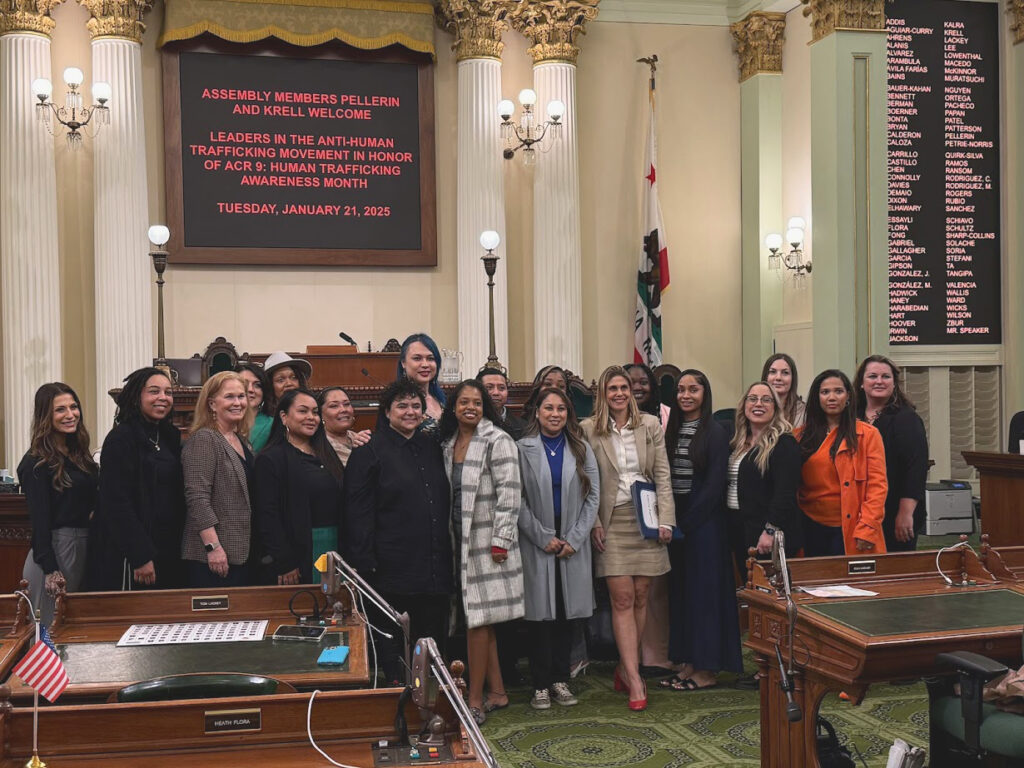Human Trafficking Recognition at the California State Legislature: PACT Makes Us Proud!
By Stuart Oppenheim, Director Emeritus, and Melissa Gomez, PACT Program Director
Thanks to the incredible efforts of our PACT (Preventing and Addressing Child Trafficking) team, I had the honor of spending an unforgettable day at the State Capitol on January 21, 2025. I truly wish all our staff could have been there to witness the impact of their work firsthand.
The day kicked off with an Assembly Roundtable, where six individuals with lived expertise in human trafficking shared their insights on shaping state policy to prevent and address child trafficking. PACT was well-represented on the panel, which was facilitated by PACT Consultant and Director of Safe and Sound for Rising Worldwide, Jess Torres. Panelists included PACT & Sunita Jain Anti-Trafficking Consultant Jimmy Lopez and PACT Bay Area-Southern CA Regional Coordinator Josie Feemster, whose vision was instrumental in making this remarkable day happen.
The audience for the roundtable included more than 10 legislators, the Lieutenant Governor, and a packed (pardon the pun) Assembly hearing room. Among the other staff in attendance were PACT Director Melissa Gomez, Central Valley-Northern CA Regional Coordinator Kelly Amend, and PACT Consultants Ummra Hang and Jamelia Hinds (who spoke passionately during the audience comments). Several key themes emerged during the discussion:
1. Leadership by Those with Lived Expertise:
Policy work should be led by those with lived experience. As one panelist shared – “Lived experts shouldn’t just be invited to the table— they should be leading the conversation and making decisions – having ownership of the table.” This principle ensures that those most affected by human trafficking have a true voice in shaping policy.
2. Sustainable Funding:
Funding for anti-trafficking programs needs to be permanent, with longer grant funded periods (more than one year), to allow for the development of sustainable programs and services. We also need to address recent cuts from the California Victims of Crime Bureau and restore those funds.
3. Collaboration over Competition:
We must eliminate the competition for funding and encourage cross-coordination and collaboration across organizations and regions. This is essential to expanding the effectiveness of anti-trafficking work.
4. Equitable and Integrated Approaches:
Human trafficking is a human issue. Victims must have access to unbiased, supportive services, providing equal access to all. As Jamelia Hinds shared, human trafficking is not a color issue or a gender issue—it is a human issue that impacts us all and preys on vulnerabilities.
5. The Impact on Lives and Communities:
The physical and emotional toll of human trafficking on victims and communities cannot be overlooked. Panelists shared about the tremendous loss of life and high lethality rates of victims and survivors. We must also acknowledge the intersectional violence and susceptibilities that lead to higher rates of victimization, particularly among BIPOC, LGBTQIA+, and those displaced by natural disasters or impacted by climate change. Panelists also noted the heightened violence against transgender people and the lack of services for male survivors.
6. Equal Access to Justice:
Everyone who experiences human trafficking deserves equal access to justice. This includes addressing the unintended consequences of policies that criminalize victims who were forced to commit crimes as part of their trafficking experience.
7. Ending the Criminalization of Victims:
Many survivors of human trafficking are unjustly treated as criminals –Some are forced to register as sex offenders or serve sentences, for crimes they were coerced to commit by traffickers. This criminalization creates insurmountable barriers to recovery and healing, limiting their ability to rebuild their lives and careers.
8. Streamlining the Vacature Process:
The process and policies for victims to vacate convictions related to trafficking (including violent crimes) must be amended, more streamlined and accessible.
9. Beyond Sex Trafficking:
While much attention has been given to sex trafficking, it’s crucial to recognize the significant issue of labor trafficking and the exploitation that occurs in various industries, as well as those exploited through forced criminality and commercial sexual exploitation (CSE).
10. Recognizing Expertise, Not Just Stories:
Lived experts should not be defined solely by their past experiences. The skills and expertise they bring to policy discussions are invaluable, and we must support them in thriving beyond trauma.
The Assembly Members who hosted the Roundtable, including Assembly Members Krell and Pellerin, clearly recognized that their work doesn’t end with legislation. They emphasized the importance of collaborating with California’s lived experience leaders to develop and implement sound policy and practice. This approach aligns with the central mission of CFPIC and reflects the exceptional work our PACT team carries out daily.
After the Roundtable, Assembly Members Krell and Pellerin introduced Assembly Concurrent Resolution 9, which formally recognized January 2025 as National Human Trafficking Awareness Month. The Resolution was adopted with 69 co-sponsors following supportive comments from additional Assembly Members. At the end of the session, Assembly Members Krell and Pellerin honored over thirty leaders with lived expertise who have made extraordinary contributions to the anti-trafficking movement in California.
We are incredibly proud of the work of all our CFPIC staff and consultants, and during National Human Trafficking Prevention Month, we pause to celebrate the contributions of our PACT team in raising awareness about this critical issue.








